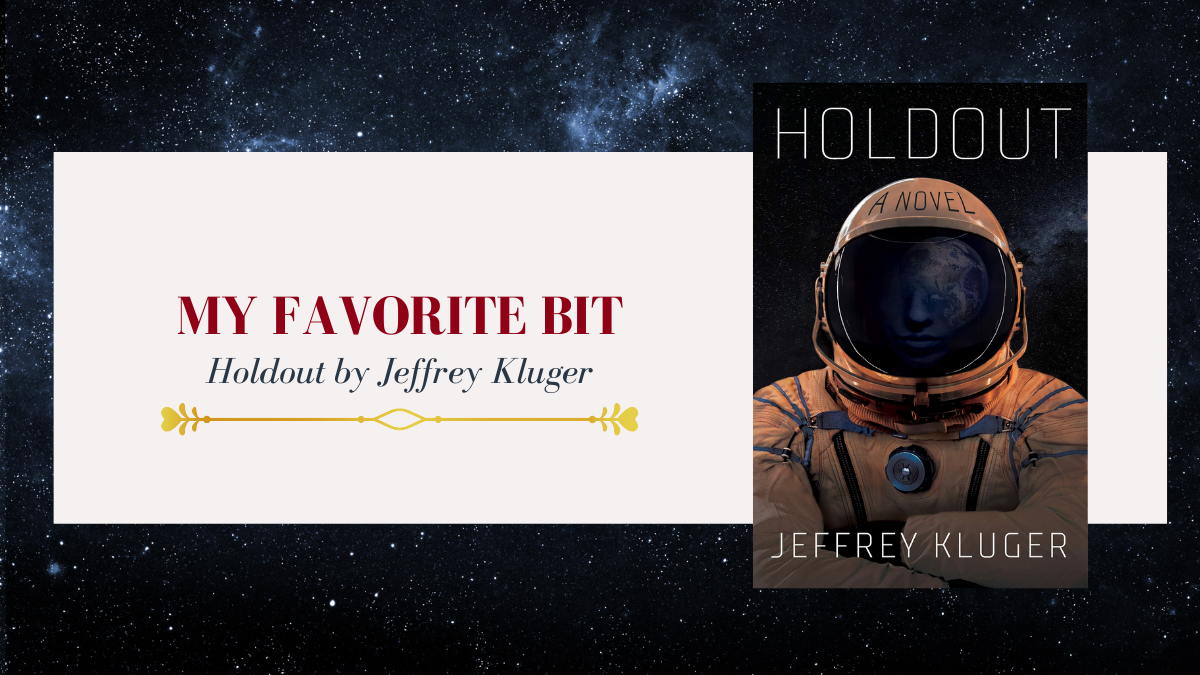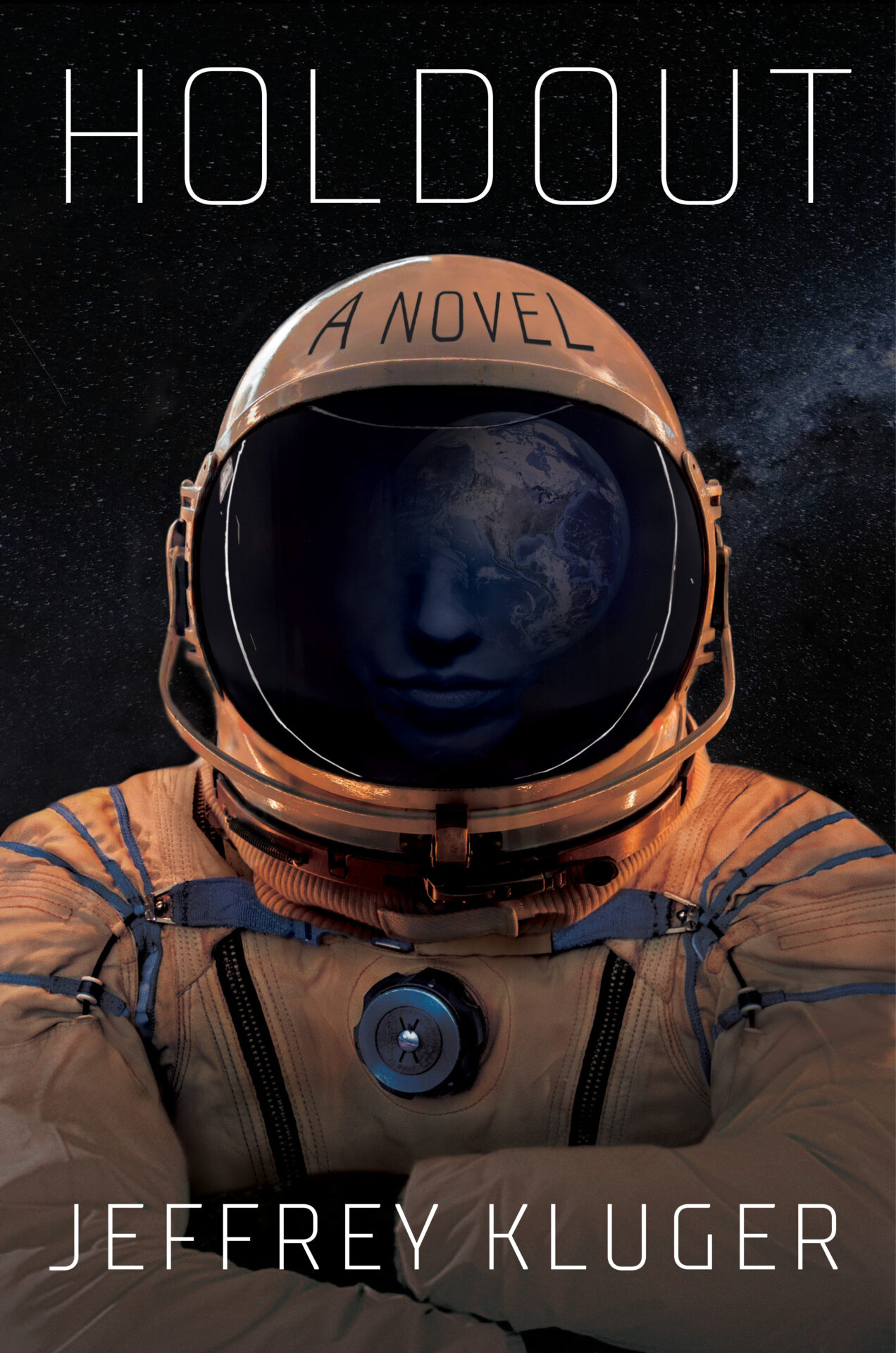
Jeffery Kluger is joining us today to talk about his novel, Holdout. Here’s the publisher’s description:
When evil forces are going unchecked on Earth, a principled astronaut makes a spilt-second decision to try to seek justice in the only place she knows how—the International Space Station.
Walli Beckwith is a model astronaut. She graduated at the top of her class from the Naval Academy, had a successful career flying fighter jets, and has spent more than three hundred days in space. So when she refuses to leave her post aboard the International Space Station following an accident that forces her fellow astronauts to evacuate, her American and Russian colleagues are mystified. For Walli, the matter at hand feels all too clear and terrifying for her to be worried about ruining her career. She is stuck in a race against time to save a part of the world that seems to have been forgotten, and also the life of the person she loves the most. She will go to any length necessary, using the only tool she has, to accomplish what she knows is right.
What’s Jeffery’s favorite bit?

JEFFREY KLUGER
For all the rhapsody and poetry people bring to writing about space, it can actually be something of a hard-edged job. Writing about space is writing about science, after all, with all of the non-negotiable rules of physics and engineering, orbital mechanics and flight dynamics, cosmology and quantum what-not that that implies. You can make space romantic, you can make space enchanting, but just beneath the dreaminess lies a bedrock of science.
I don’t mind that. When I wrote Apollo 13, there was so much human drama involved that I could include all of the science I wanted and readers would, I was confident, stay with the story. The same was true when I wrote Apollo 8. The rule I always apply in cases like this is to make the science just easy enough that anyone can understand it, and just hard enough that when they do understand it, they’re proud of themselves. That’s the kind of writing I appreciate when I’m reading something unfamiliar and head-crackingly difficult—like a dense news story on economics or abstract art or, for that matter, rugby.
I brought that same rule to writing my new novel, Holdout, which is about an American astronaut who refuses to come home from the International Space Station—declaring simply that she “would prefer not to”—in order to protest a grievous wrong that’s taking place back on Earth. Fiction or not, the story still had to keep the science true to real life and I endeavored to make it so. But fiction is liberating too, and scientific laws can be bent and broken, as long as the crime is sort of a narrative misdemeanor—one on which the plot does not turn. One such bit of latitude I gave myself occurs early in the book, in a section that seemed to lend itself to a bit of fancy and fantasy.
It’s late at night in the Brazilian Amazon, and one of my characters is lighting a fire for the occupants of the space station to see as they pass by. Seeing a campfire from space is actually not the rule-breaking part since at least one imaging system aboard the station can resolve objects on Earth down to that scale—especially if the object is a bright fire in a dark clearing in the Amazon night. The rule-breaking comes when one of the logs the character lights is mahogany, and she recognizes that, for her, that wood has special properties when it’s set afire:
“She swore there was something about the color of the flame that she saw nowhere else—a faint shimmer of violet so different from ordinary violet that it seemed to be straining to become another color entirely. No one else in the group she lived with here could see it, and at least a few of them doubted that she could either. She didn’t blame them. The color she saw looked as if it lived at the high, far, exiting edge of the visible spectrum, a final, discernible flicker of electromagnetism, just at the point of hurrying off into the x-ray and gamma ray frequencies where all energy vanished from view. It was a wonder even she could see such a thing.”
The truth is, of course, she couldn’t see such a thing. No one can. Her ability to do so has no role in the plot; indeed, it’s mentioned only one or two other times in the book. But it allowed for a certain flicker of enchantment that I felt I could afford to indulge myself.
My two earlier young adult novels were full-on works of magical realism and I dearly loved writing them—especially because of the freedom they allowed me to invent whole worlds. I did not get to invent a world in Holdout—at least not one in which magical things are forever happening. But I did get to invent a moment. Over the entire arc of the book, it is the one that never fails to make me smile.
LINKS:
Author Page: Time.com
BIO:
Jeffrey Kluger is editor at large for Time magazine and the author or coauthor of twelve books, including Apollo 13, Apollo 8, and two novels for young adults. He has written more than forty cover stories for Time on topics ranging from space to human behavior to climate to medicine. Along with others at Time, Kluger won an Emmy for the web series A Year in Space. He consulted on and appeared in the Tom Hanks movie Apollo 13.
